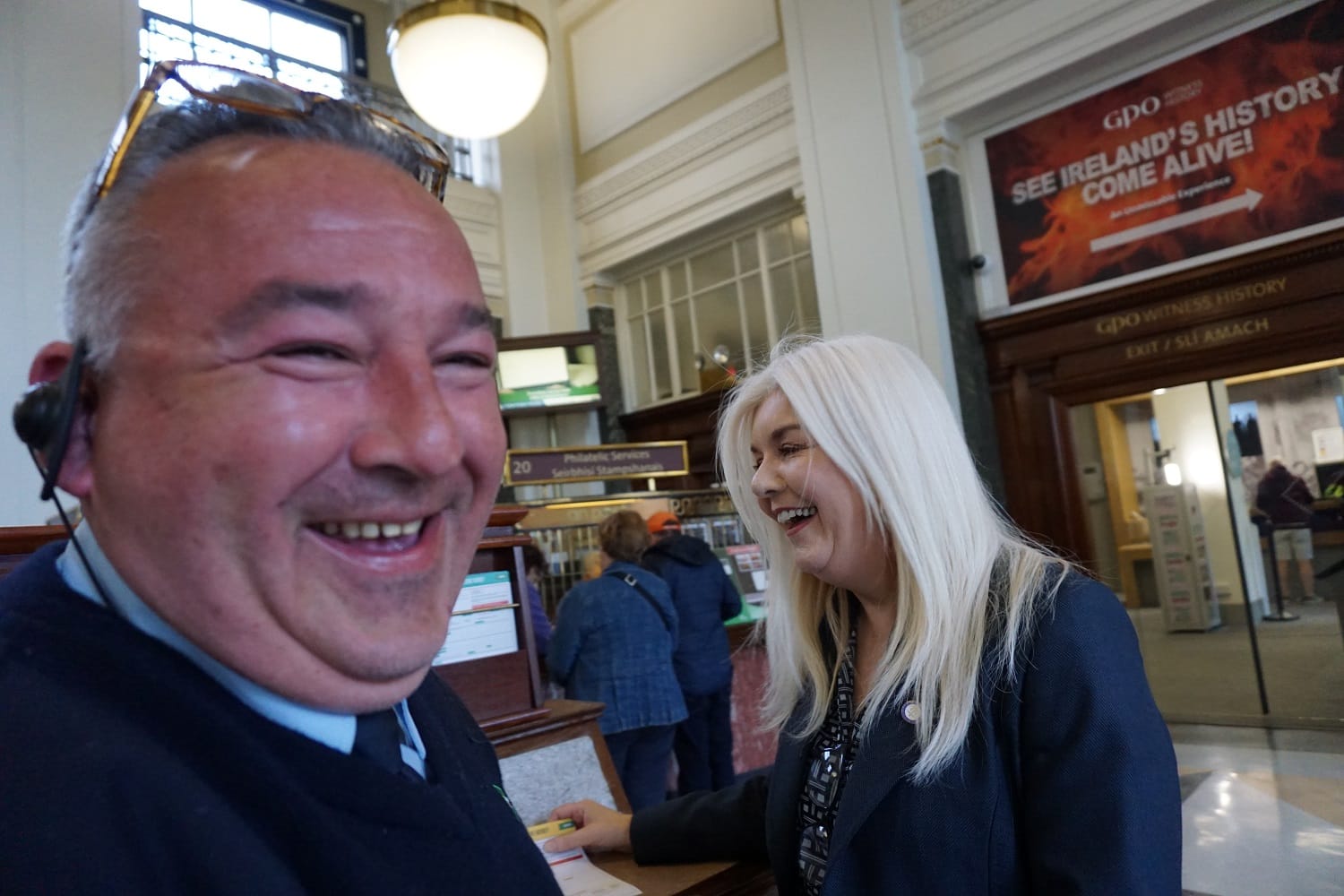What’s the best way to tell area residents about plans for a new asylum shelter nearby?
The government should tell communities directly about plans for new asylum shelters, some activists and politicians say.
Debbie Gilligan likes to talk to people face-to-face. Not at the other end of a phone or computer. No, she’s always worked at the counters.

Debbie Gilligan sits behind the glass at counter 14. The sign above her says “social welfare, bill payments, savings, financial services”, in Irish.
It’s not a particularly busy Friday afternoon in the GPO. The longest queue is in front of the nearby lotto counter.
But there is a steady squeaking of soles on the speckled tile floor.
Two tourists walk in and stop to look at a plaque about the GPO and the Easter Rising.
Tourists love the building, Debbie says. “They give out about the price of the stamp, but they’ll also compliment you.” She chuckles.
“And then I say, ‘Well, maybe the next time you’re back, there might be a little machine here.’ And they’re like. ‘No, no, please, because everything is gone now.”
Customers like to know that if they get stuck, there’s a person there to help them, Debbie says.
“If someone has a form, they might say, ‘I haven’t got my glasses,’ or, ‘I can’t read or write, would you mind?’”
Debbie likes the variety show of customers, she says. The pensioners, jobseekers, and new arrivals.
If someone shows up at the counter and can’t speak English very well, Debbie says she asks if there is a friend they can call to translate.
She talks about the address service for homeless people, who are shunted from B&B to B&B. “If anything comes then, they just come in with their ID, and we hold it here,” she says.
She gets kids coming in to buy squirrel stamps, little one €1 stamps to stick into a book. Once they have 20, they can lodge the money into their account.
“It’s gas looking at them coming over. I’m like, ‘Yeah, oh you’re a good boy saving all your money,’ and he’s just looking at you, probably going, ‘Shut up, just give me the stamps.’”
People don’t send letters anymore, Debbie says. So now there are phones and current accounts and loans. “We have to start getting involved in that just to keep us kind of afloat, just to keep us going.”
The banks have dropped much behind-the-counter service. “People will say, ‘I’ve just been over in the bank and there’s nobody there, and they don’t want to take cash after a certain time,’” she says.
“It’s like they don’t want to deal with people,” she says.

On a break, Debbie sits in the cafe at the GPO Visitor Centre next door. Visitors wander through, looking at old photos and artefacts in glass cases along the walls.
Debbie says she makes an effort to talk to people. Just little pleasantries. Using their names when she can.
Maybe they haven’t spoken to anyone else that day, she says. “Sometimes they don’t even answer you, you know, but you do your best. That’s the way I would be now.”
On the flip side, she can tell when someone is itching for a row. When that happens, she tries to defuse it. Sympathy works, she says.
“I think it’s nice for someone human to be there and, even if it is only to vent a little bit or give out about something,” says Debbie.
Maybe all they need is a nod, or an “Oh yeah, I know, it’s terrible.” “Then they’re grand, and they’re on their way,” she says.
Debbie likes to talk to people face-to-face. Not the kind of customer service where people are at the other end of a phone or computer. No, she’s always worked at the counters.
“I’m only here about 13 years. In the scheme of things, I’m only a blow in,” she says.
“Yes, the common phrase for that is a red arse,” says Jim McDonnell, her supervisor, who’s come to sit next to her.
“Don’t put that in,” she says.
Can I put that in? I ask.
“Yes, of course you can,” Jim says. “It signifies nappy rash, so she’s still considered to be a baby.”
Jim himself has worked at the GPO for, what, 33 years? Others have been here even longer.
Everybody wants to work in the GPO, he says.
Debbie just loves it, she says: “It’s so big, and there’s just a big range of people and ages. That feels like where I should be, you know that way?”
Debbie has always had a thing for shoes. Growing up in Artane, she wanted to work in a shoe shop in town.
“You know the old shoe shops where they used to have to walk up the ladder and get the boxes down?” she says.
She likes working in town because of, among other things, her proximity to the shoe shops. She bought a pair last night, on her way home. Boots reduced from €111 to €49 that will “never go out of fashion”.
Today, she’s wearing a pair of black brogues with her An Post-issued navy suit and blue and white top.
Along with shoes, Debbie has always loved a stamper.
It started with the post office set she got for Christmas when she was six. A little till and fake plastic money, and a stamp and ink pad, too.
“I just remember there was a lot of stamping going on. There was a lot of this going on, you know?” She bangs on the table with her fist.
“Mam was probably finding stuff with ‘Post Office’, ‘Post Office’ written all over it,” she says.
She corralled her younger brother into playing with her. He didn’t end up working for An Post, but he did work for DHL for a time, she says.
At work, she uses a date stamp all the time. Sometimes, she gets really into it. “Someone will go, ‘Oh my god, my head!’” she says.
“Well Breda, how are ya?” Debbie says as she walks back into the main section of the GPO.
A woman with a shopping trolley is standing at one of the high wooden tables by the doors, where people go to write out addresses and seal envelopes. She looks over at Debbie. “Why aren’t you working?”
Breda is one of Debbie’s regulars, coming in on Fridays to buy stamps.
“She always puts me little stamps in the bag so I don’t lose them and everything,” Breda says. “She knows me. She does have them ready.”
“Your usual, is it? Haha,” Debbie says, as Breda grabs the handle of her trolley and starts for the door.
“Slán,” she says, rolling away.

Get our latest headlines in one of them, and recommendations for things to do in Dublin in the other.